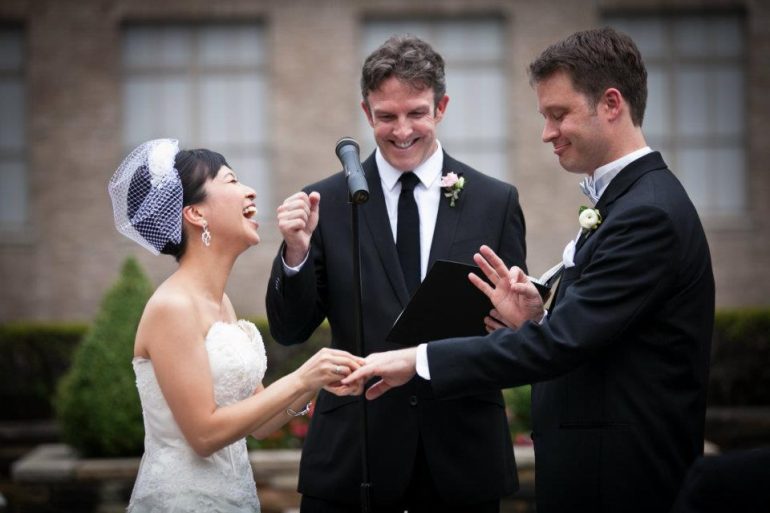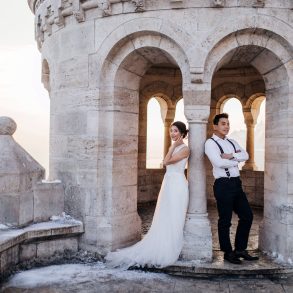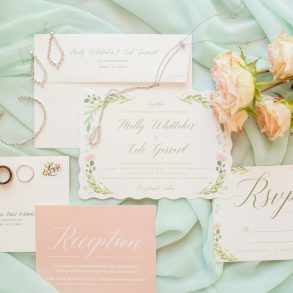- What happens if something happens to you and you can’t officiate our wedding?
You’re putting a lot of eggs into one basket with your officiant; they should have a plan in place, in their contract, should something horrible happen to them or their family that would preclude them from officiating for you.
- Do you have any experience with multi-faith couples, same-sex couples, blended families, etc?
The world is a fondue pot. Your officiant should be able to help you integrate traditions or rituals from multiple faiths; if your officiant has no experience with such challenges, you may want to keep interviewing candidates. Same-sex weddings afford an openness of expression and a skilled sensitivity that opposite-sex ceremonies often lack; your officiant should have experience with the nuances, complexities and joys of such ceremonies. And if you’re a same-sex couple from different faiths and children from previous marriages, you’re going to want to hire someone who knows how to celebrate all these things with dignity.

Image via Jessica Jordan Events
- How much do you participate in rehearsals?
A good officiant has a vision of the entire ceremony from the very start to the very finish, one that extends beyond his or her part in it. They will have the ability to quarterback the entire wedding party and coordinate with all the other vendors involved (musicians, DJs, photographers, planners etc.) If an officiant tells you ‘they really don’t have to be at the rehearsal’, that suggests that they do not want responsibility for anything beyond their minimal participation. An officiant should care as much if not more about the ceremony than the couple.
- Can you help us write our personal vows?
Any officiant with experience has heard many iterations of vows; their answer to this question should be ‘yes’ within one second of you asking the question. Then they should outline how they work with couples to write vows. If they say, ‘what’s a vow?’ turn slowly and walk away.
- How many hours do you spend working on ceremonies?
This will give you an idea of how much time a good officiant puts into his or her work. The answer may surprise you; nobody sees the hours of work the officiant does, but everyone goes nuts over how many hours the photographers spend with couples day-of. Photographers are paid a fortune; officiants are one of the smallest pie-slices of wedding budgets – not that we’re bitter. When an officiant tells you they spend 10 hours on the ceremony alone, add that to the number of hours they spend with you at rehearsal and day-of and reconsider your wedding budget. The misconception is that the officiant just shows up and talks for 20 minutes and that’s it. Not true. #PayTopDollarForProOfficiants

Image by Nicki Fietzer DeNueva Photography
- How did you train to become an officiant?
Yes, people can train for this work! If someone tells you they studied at the Celebrant Foundation and Institute, you’ve got yourself a capable, professional, dynamic storyteller. If they trained via some religious institution, they’ve probably observed many ceremonies and have a good grasp of process, elements and professional decorum. If they tell you they signed up online on a whim, or if they are some friend or family member who’s never officiated a wedding before, you’ve got yourself a potential disaster in the making.
- What is the typical order of services for the ceremonies you officiate?
The officiant should be able to tell you a typical order of service without consulting any notes, while also assuring you that they are open to rearranging this order as requested. This will give you an idea of the officiant’s experience, ceremonial priorities, flexibility, and their balance of logic and creativity.
- What are your favorite moments in wedding ceremonies?
Professional Officiants have a unique, wonderful job; their answer to this question should help prove how much they love the work and who they really are as a person. If they can make you cry answering this question, they will be able to make your guests cry during the ceremony.

Image by Inbal Sivan
- What is the most difficult thing about your job?
If your officiant can’t think of anything difficult, they’re lying. If they start ragging on past clients, you may want to question their sense of discretion. Ideally, they’ll present their answer honestly with a positive spin of how they turn challenges into learning experiences or opportunities.
- What other questions should we be asking you?
Every officiant will have other details they want to tell you about their work or about wedding ceremonies in general; asking this question is a catch-all for other questions you may not have thought of. Plus, this will help you learn what kind of ceremonial or practical elements are really important to this officiant.
- Do you let your clients have final approval over the wedding ceremony script?
The only answer to this should be ‘yes.’ It’s your wedding, not theirs. If the answer is no, excuse yourself to the bathroom and never come back to the table.
Featured image by Roseann Wang Photography






